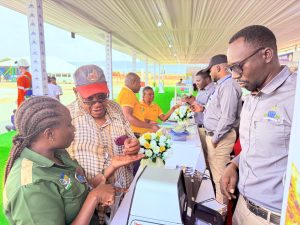TFS, FAO Embarks On More Than USD6.8m Worth Integrated Landscape Management Project
By STAFF REPORTER
THE Tanzania Forest Service (TFS) in cooperation with the Food and Agriculture Organization of the United Nations (FAO) has officially embarked on implementation of the Integrated Landscape Management in the Dry Miombo Woodland of Tanzania project (DSL IP Child Project for Tanzania).
The robust five –years project (2022-2027), is expecting to gobble up to USD 6,875,882million, equivalent to 16,808,237,942bn/-, being funds from the Global Environmental Facility (GEF Phase-7), and will be executed in the Tabora zone (Kaliua Landscape) and Katavi (Mlele landscape).
Among others, the project’s chief vision is to address a challenge of land degradation and loss of biodiversity within the country’s Southwest dry Miombo Woodlands through application of collaborative approach in environmental management.
Speaking at the project’s tailor-made inception workshop, held over the weekend in Dodoma Capital City, Dr. Revocatus Mushumbusi, the Director General of the Tanzania Forestry Research Institute (TAFORI), said the initiative is part of the on-going efforts to foster programmatic collaboration and integration among 11 countries.
According to him, the countries, including Angola, Botswana, Malawi, Mozambique, Namibia, Zimbabwe, Tanzania, Kenya, Burkina Faso, Mongolia, and Kazakhstan, and the initiative meant to contribute to a paradigm shift in the way dryland landscapes are sustainably utilized and managed to achieve transformative impact at scale.
He was speaking on behalf of the TFS’s Conservation Commissioner, Professor Dos Santos Silayo.
“Tanzania stands second globally for harboring vast Miombo Woodlands, being at least 90 percent of the available forests, but despite such prestigious endowment the potential woodlands are currently being threatened by increasing development of degradation, as well as mass destruction of the dry Miombo Woodlands,”he said.
Moreover, Dr. Mushumbusi added that, severe effects of climate change, encroachment in forest areas as well as mass cutting of trees for charcoal generation were among other negative factors that continue to place the country’s dry Miombo Woodlands at stake.
In his remarks, Assistant FAO Representative, Charles Tulahi expressed that the project was a result of hard work from a range of partners, and appreciated the efforts so far demonstrated by the government of Tanzania and all key stakeholders who supported the project from the formulation stage until its inception.
“We are here today because we believe we have a lot to contribute in improve our natural environment, promote and protect biodiversity and the ozone layer, address climate change and respond to land degradation, and organic pollutants. We all know that forests support human livelihoods by providing essential ecosystem services that help agriculture, regulate water flow, stabilize soils, maintain soil fertility, and regulate the climate,” he expressed.
He added, it was disconcerting that, despite their significance, forests are disappearing at an alarming rate around the world.
“Every year, an estimated 7.3 million hectares of forest are lost. The situation is comparable to that of Tanzania, where it is estimated that over 460,000 hectares of forest are destroyed each year. Thus, it is our duty and obligation to take remedial actions which will reverse this situation,” Tulahi insisted.
He further detailed that FAO has been on the front line to support the government of the United Republic of Tanzania in addressing observed challenges.
The support includes, the development of the National Forest Resources Monitoring and Assessment (NARFORMA), review of the Forest Policy and Forest Act; development of the third report of the State of the Environment, and implementation of the Voluntary Guidelines on the Responsible Governance of Tenure of Land, Fisheries and Forests in the Context of National Food Security (VGGT).
“To address the root causes and barriers related to forest and land degradation, an integrated landscape approach is highly needed in order to overcome these complex environmental problems. For many years, the landscape approach has become more important in developing sustainable strategies for natural resource management,” he added.
FAO Strategic Framework 2022-31 seeks to support the 2030 Agenda through the transformation to more efficient, inclusive, resilient and sustainable agri-food systems for better production, better nutrition, a better environment, and a better life, leaving no one behind.
Implementation of the project aligns with the numerous and relevant on-going national strategies and plans for the conservation of forests, ecologies, biodiversity among others.











